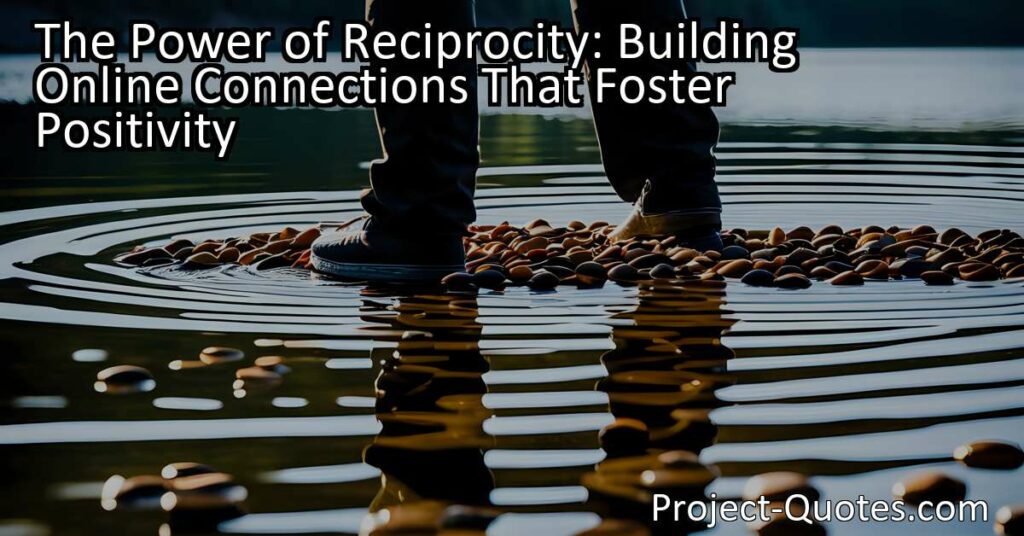What you give is what you get.
Byron Pulsifer
The Power of Reciprocity: Building Online Connections That Foster Positivity In a world of technology and social media, our online connections may seem intangible, but they have a true impact. By spreading kindness, compassion, and empathy in our online interactions, we create a digital environment that fosters personal growth and positivity, benefiting not only ourselves but also our relationships, communities, and the world at large. Let us strive to be the change we wish to see online, knowing that what we give truly is what we get.
Table of Contents
Meaning of Quote – What you give is what you get.
“What you give is what you get.” These words by Byron Pulsifer hold a significant truth that resonates in our everyday lives. From the simplest acts of kindness to our interactions with others, what we offer to the world often comes back to us in one way or another. In essence, our actions and the choices we make have the power to shape our personal and social experiences.
At its core, this quote can be understood as the principle of reciprocity. According to this principle, the way we treat others will ultimately determine how we are treated in return. Just like a boomerang, the energy we put out into the world tends to come back to us. If we spread kindness, compassion, and understanding, we are more likely to receive these positive qualities in return.
Think about the interactions you have with your family, friends, and classmates. When you extend a friendly hand or lend a helping hand to someone in need, you create a ripple effect of goodwill. By showing empathy or being there for others, you not only make their day a little brighter but also set the stage for reciprocal acts of kindness towards you in the future.
Take the time to consider the effect of your actions on someone’s day. A smile, a genuine compliment, or even a simple act of listening attentively can go a long way in brightening someone’s mood. By sharing positivity and compassion, you inspire others to do the same, creating a virtuous cycle of kindness.
It is important to remember that “what you give is what you get” also applies to negative actions. If we choose to spread negativity, gossip, or cruelty, we shouldn’t be surprised when those same things find their way back to us. The energy we put out into the world always finds its way back to us, and often in unexpected ways.
So, why not make a conscious effort to be mindful of how we interact with others? If we want to foster an environment of love, respect, and unity, it starts with us. By embodying the qualities we wish to see in the world, we can create a positive atmosphere where others feel comfortable to do the same.
However, it’s important to acknowledge that even though we may strive to do good, it doesn’t mean that we will never face challenges or negative situations. Life can be unpredictable, and sometimes, despite our best efforts, we may still encounter hardships. Yet, what sets us apart is how we choose to respond to those challenges.
By embracing the principle of “what you give is what you get,” we can navigate life’s obstacles with grace and resilience. Instead of succumbing to negativity or despair, we can choose to rise above difficult circumstances by focusing on the solutions, by extending understanding and compassion to others, and by maintaining a positive mindset.
Moreover, it is crucial to recognize that the concept of reciprocity extends beyond our individual relationships. Our actions within larger communities, such as our schools, neighborhoods, and even online platforms, also play a vital role in shaping the world we live in.
When we contribute positively to our communities, we are not only enhancing our personal lives but also improving the lives of those around us. By volunteering our time, participating in community events, or supporting local businesses, we help foster a sense of togetherness and unity that benefits everyone involved.
Additionally, the impact of our actions can extend beyond immediate interactions. As we give, we inspire others to give as well. Our acts of kindness and generosity can create a domino effect, encouraging others to pay it forward and create a chain reaction of positivity within our communities.
In this age of technology and social media, where we have the power to connect with people across the globe, the principle of “what you give is what you get” becomes more evident than ever. Each comment, post, or message we put out into the virtual world carries the potential to shape someone’s day, provoke thought, or even transform lives.
Even though our online connections may seem intangible, the impact they have is very real. Therefore, it is crucial to be mindful of the content we contribute to online spaces. By spreading words of encouragement, sharing uplifting stories, or engaging in respectful discussions, we create a digital environment that is conducive to personal growth and positivity.
In conclusion, Byron Pulsifer’s quote serves as a powerful reminder that our actions have consequences, and the energy we put out into the world often finds its way back to us. By embodying the principles of kindness, compassion, and empathy, we foster an environment of positivity that not only benefits us but also extends to our relationships, communities, and the world at large. So, let us strive to be the change we wish to see, knowing that what we give truly is what we get.
I hope this quote inspired image brings you hope and peace. Share it with someone who needs it today!


